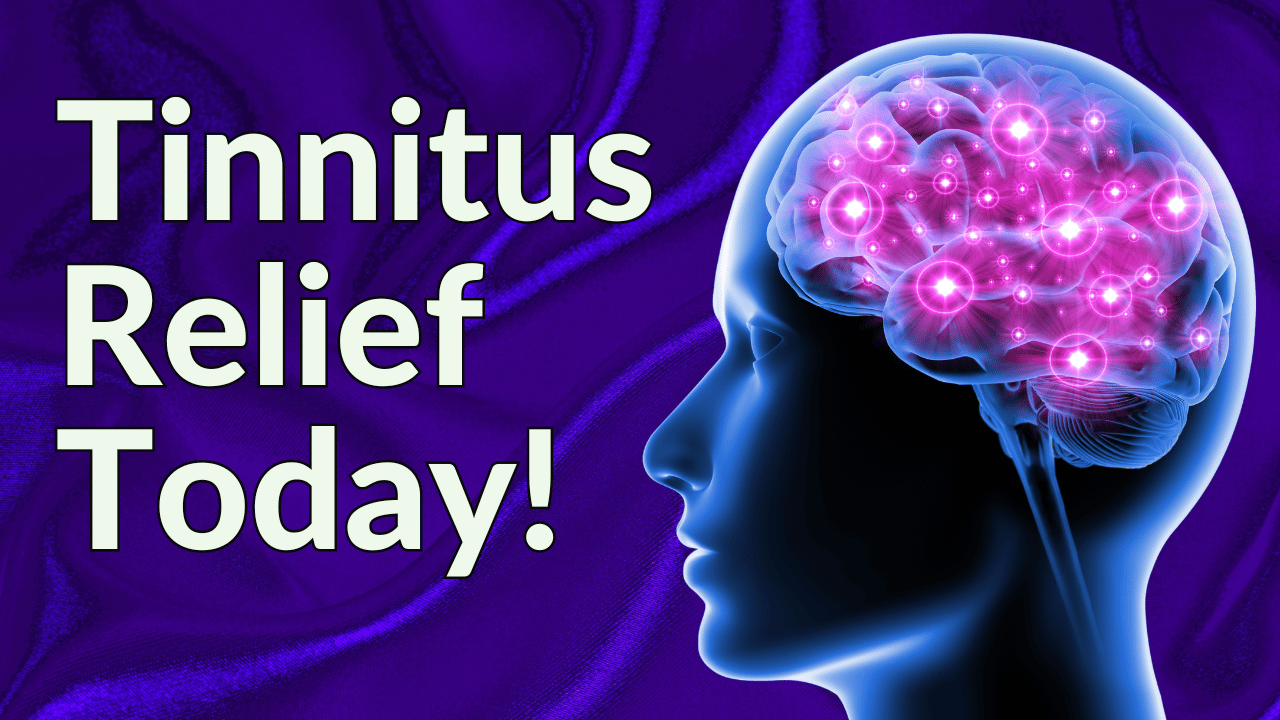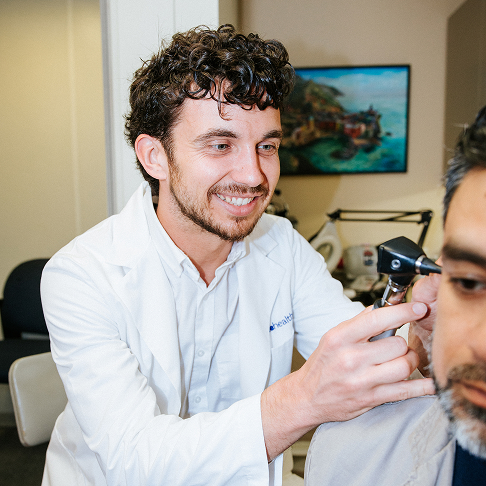Imagine the profound silence of a quiet room suddenly invaded by a persistent ringing buzzing or hissing sound that only you can hear. This intrusive experience, known as tinnitus ,affects millions of people globally. For some it might be a fleeting annoyance; a background hum that eventually fades. Because of this, many wonder: why do some people find relief and others don’t? If you’ve been asking this, you’re likely searching for the best treatment for tinnitus, and you’re not alone!
"As a recent graduate who’s achieved stage four habituation, I cannot thank Treble Health enough for getting me to the finish line."

"As a recent graduate who’s achieved stage four habituation, I cannot thank Treble Health enough for getting me to the finish line."
– Louis
Book a free consultation to learn which Treble Health solution is right for you. Join Louis and thousands more who have found lasting tinnitus relief.
At Treble Health we frequently encounter a poignant question from those grappling with this invisible sound. The answer is not that simple. It is a nuanced interplay of an individual’s neurological responses, psychological factors, behavioural choices and most critically the timing and type of intervention they receive.
Has Anyone Found Relief From Tinnitus?
Yes, absolutely! While a universal “cure” that eliminates the sound for everyone remains elusive, a wealth of evidence-based treatments exists that can dramatically reduce the impact and distress of tinnitus. This leads to profound and lasting relief, allowing people to reclaim their lives from the grip of this condition. For many, lasting relief comes when they discover the best treatment for tinnitus that matches their specific situation.
The key is a personalised multimodal approach that recognizes that each person’s tinnitus journey is unique. Lasting relief often emerges from a carefully selected combination of therapies tailored to an individual’s specific needs.
Various Therapies at Treble Health
Cognitive Behavioral Therapy (CBT) for Tinnitus
This powerful therapy does not change the sound itself but it fundamentally changes your relationship with it. CBT is a structured form of psychotherapy that teaches you to identify and reshape unhelpful thought patterns and emotional reactions to tinnitus. Many people with tinnitus fall into a negative cycle where the sound causes anxiety and the anxiety makes the sound seem louder. CBT helps to break this cycle. It is widely recognized as the most evidence based treatment for reducing tinnitus related distress.
For instance a landmark randomized controlled trial by Cima R.F.F. et al. (2012) published in The Lancet showed that a specialised form of CBT significantly outperformed standard care in improving patients’ quality of life and reducing tinnitus severity.

Tinnitus Retraining Therapy (TRT)
TRT is a specialised therapy that aims to help your brain reclassify the tinnitus sound as something neutral and unimportant. It operates on the principle that the distress from tinnitus comes from the brain perceiving the sound as a threat.
Through a combination of directive counseling and sound therapy the goal is to facilitate habituation; a neurological process where your brain learns to ignore the sound moving it from the foreground of your attention to the background.
Hearing Aids for Tinnitus
For the vast majority of people who experience tinnitus alongside some degree of hearing loss hearing aids can be incredibly effective. By amplifying the external sounds of the environment they enrich the auditory world. This can effectively mask the tinnitus making it less noticeable and easier for your brain to tune out. This provides relief while also improving communication and reducing the listening effort that can exacerbate tinnitus.
Sound Therapy Options
Sound therapy tools can provide immediate relief by either masking the tinnitus or helping your auditory system become less sensitive to it over time. These tools can range from simple white noise machines and nature sound apps to more sophisticated customised notched audio designed to target your specific tinnitus frequency. Together sound therapy and hearing aids are powerful aids in both masking the sound and promoting long term habituation.
Real Stories, Real Relief: The Patient Journey from Tinnitus to Peace
These proven approaches are based on real patient journeys. True stories give clear insight into what makes the difference when managing tinnitus.
Julia Reduced Her Tinnitus Awareness by 50% in 6 Months
Julia came to Treble Health after struggling with tinnitus and severe sound sensitivity that made everyday noises intolerable. At first, she reported 80% tinnitus awareness with an average volume of 6 out of 10. Through a program of ear-level sound therapy and 1-on-1 neuroplasticity coaching, Julia began to habituate.
After 6 months of treatment, her tinnitus awareness dropped by 50%, and her sound sensitivity improved. After 1 year, her hyperacusis completely disappeared. Julia’s experience proves that with the right tools, the brain can adapt even after months of distressing symptoms.
Matt Lowered His Tinnitus Awareness from 80% to 10% in 6 Months
Matt joined Treble Health after a tinnitus spike caused anxiety, poor sleep, and focus issues. His starting point was 80% tinnitus awareness with a volume of 6 out of 10. His program combined sound therapy, tinnitus-programmed hearing aids, and personalized coaching.
After 3 months, Matt noticed significant improvement. By 6 months, his tinnitus awareness dropped to 10%, his sleep normalized, and his tinnitus became softer. Matt’s story shows how staying committed to a full treatment plan can lead to lasting relief.
These contrasting experiences underscore how a proactive mindset and consistent engagement with a comprehensive treatment plan profoundly shape the journey toward tinnitus relief. There are more inspiring stories of real people who found tinnitus relief.
Why Does Tinnitus Go Away For Some People?
When people say their tinnitus “went away” they are typically describing a state of habituation. This is a neurological process where the brain learns to filter out the tinnitus sound pushing it to the background of awareness so it’s no longer intrusive or distressing. The sound’s neural signal may still be physically present but the brain no longer perceives it as a threat or an important event worth paying attention to.
Tinnitus itself is a symptom not a disease and it can stem from many sources. The most common culprit is hearing loss whether from noise exposure or age related changes. However it can also be triggered by ear related issues like infections or excessive earwax head and neck injuries, jaw disorders like TMJ, certain medications or even high levels of stress. To explore more about these underlying causes and susceptibility to tinnitus you can find detailed information on our site.
Why Do Some People Develop Tinnitus and Others Don’t?
Tinnitus is a symptom that can arise from a variety of underlying causes, such as:
- Noise-induced or age-related hearing loss
- Ear infections or excess earwax
- Head and neck injuries
- TMJ disorders
- Neurological conditions
- Stress and anxiety
- Ototoxic medications
But not everyone exposed to these risk factors gets tinnitus. Genetic differences, brain plasticity, and emotional health may explain why some people are more resilient than others.
The Brain’s Role: Why Reactions Matter More Than Sound
The plot thickens however, because not everyone exposed to these risks develops chronic tinnitus. This points to the crucial role of individual neurology. Scientific research increasingly reveals that the distress caused by tinnitus is often less about the volume of the sound and more about how your brain reacts to it.
In chronic tinnitus, certain brain regions, notably the limbic system (our emotional center) and the auditory cortex (where sound is processed), can become overly activated. Research by Langguth et al. (2013) in Nature Reviews Neurology sheds light on how neurophysiological differences might explain why only some individuals develop chronic tinnitus despite similar exposures.

This is why psychological factors are so important. Factors like anxiety, depression, or chronic poor sleep can significantly amplify the perceived loudness and intrusiveness of tinnitus by keeping the brain in a state of high alert. As Leaver, A.M. et al. (2016) highlighted in their work published in Hearing Research, these complex auditory-limbic interactions are central to the experience of tinnitus.
Conversely, individuals who develop adaptive coping mechanisms and learn to accept and adjust to their condition tend to fare much better than those who catastrophize or dwell on the condition. The profound emotional and neurological influence on tinnitus severity is why a multidisciplinary approach is so effective.
Does Tinnitus Have Any Benefits?
While tinnitus itself is a distressing medical condition with no direct benefits, many people who successfully learn to manage it report unexpected positive life changes that arose from their journey. The process of managing tinnitus often forces a renewed and profound focus on overall health and wellbeing.
To find relief individuals must learn to master skills that benefit every aspect of their lives. These “benefits” are not of the condition but of the commitment to overcoming it.
- Superior Stress Management Techniques like mindfulness and deep breathing learned specifically for tinnitus become powerful tools for managing all of life’s other stressors. A study by Gans J.J. et al. (2014) showed that mindfulness based tinnitus stress reduction holds significant promise for improving distress.
- Improved Sleep Hygiene Because tinnitus often disrupts sleep patients learn evidence based strategies to get better rest. By utilizing tools from our specialized CBTi for tinnitus program many people report better sleep than they had even before their tinnitus began.
- Greater Self Awareness The journey requires tuning into your body’s emotional and physical responses fostering a deeper mind body connection and a greater appreciation for quiet moments.
In this way the commitment to managing tinnitus can become a catalyst for building a healthier, more resilient and more mindful lifestyle.
Can People Learn to Live with Tinnitus?
It is absolutely possible for individuals to learn to live well with tinnitus, with many achieving a state where the sound no longer negatively impacts their quality of life. The cornerstone of this successful adaptation is a neurological process known as habituation.
The Power of Proactive Care and Personal Commitment
One of the most vital predictors of successful habituation is early intervention. Addressing tinnitus promptly helps to prevent harmful brain patterns from becoming deeply ingrained, minimises distress before it can spiral and equips you with healthy coping strategies from the very beginning. The longer tinnitus persists without intervention the more neurologically and emotionally entrenched it can become.
Ultimately no treatment no matter how advanced can succeed without personal commitment. Individuals who remain actively engaged in their therapy diligently apply daily strategies and set realistic expectations are consistently the most likely to experience improvement.
Your Path to Relief Starts Here
While a “quick fix” for tinnitus may not exist, effective management and lasting relief are absolutely possible. Whether you have been experiencing the sounds for weeks or years our audiologists at Treble Health are dedicated to helping you reduce the distress associated with your tinnitus, improve your sleep and focus and reclaim your peace of mind. Discovering the best treatment for tinnitus often begins with taking that proactive first step toward understanding your condition and committing to the right support.
Ready to take a proactive step towards understanding and managing your tinnitus? Do not let symptoms worsen. Early action is key to a more peaceful future. Schedule your free 20-minute consultation and take the first step toward effective tinnitus management.
Next Step: Book Free Consultation
- 75% of patients reduced their tinnitus within three months after following our recommendations.
- "I feel like Treble Health literally gave me my life back." - Randy S. (verified customer)
- Join thousands of people who have reduced their tinnitus after scheduling a free consultation.















